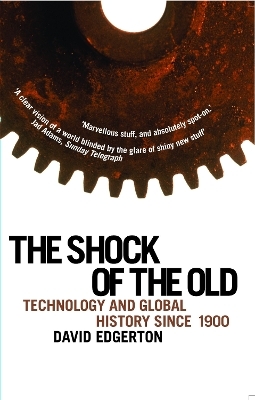
The Shock Of The Old
Technology and Global History since 1900
Seiten
2008
|
Main
Profile Books Ltd (Verlag)
978-1-86197-306-1 (ISBN)
Profile Books Ltd (Verlag)
978-1-86197-306-1 (ISBN)
- Titel gebraucht verfügbar
- Artikel merken
Presents the history of technology that casts aside the usual stories of inventions and focuses instead on what people actually use. This book assesses the relationship of technology and society, using unrecognized examples such as Spanish synthetic petrol, Japanese rickshaws, American gas chambers, Soviet tractors and Turkish battleships.
Standard histories of technology give tired accounts of the usual inventions, inventors, and dates, framing technology as the inevitable march of progress. They split history into ages - electrification, motorisation, and computerisation - and rarely ask whether anyone bothered to use these inventions at the time. Shock of the Old is not one of those histories.
Instead of asking when a technology came to be, David Edgerton asks when the average person started using it. He reveals that decades- and centuries-old technologies are often critical parts of modern achievements, and that old technologies can remain dominant long after they were supposedly superseded. Letters exist alongside emails and outlasted telegrams; we still make physical books and magazines despite the rise of the Internet - a belated rise considering that the technologies that made it possible was invented in 1965.
Shock of the Old forces us to reassess the significance of old inventions such as corrugated iron and sewing machines and rethink the relative importance we place on the invention of something new, its application, and its widespread adoption. It challenges the idea that we live in an era of ever increasing change and, interweaving political, economic and cultural history, teaches us to think critically about technology.
Standard histories of technology give tired accounts of the usual inventions, inventors, and dates, framing technology as the inevitable march of progress. They split history into ages - electrification, motorisation, and computerisation - and rarely ask whether anyone bothered to use these inventions at the time. Shock of the Old is not one of those histories.
Instead of asking when a technology came to be, David Edgerton asks when the average person started using it. He reveals that decades- and centuries-old technologies are often critical parts of modern achievements, and that old technologies can remain dominant long after they were supposedly superseded. Letters exist alongside emails and outlasted telegrams; we still make physical books and magazines despite the rise of the Internet - a belated rise considering that the technologies that made it possible was invented in 1965.
Shock of the Old forces us to reassess the significance of old inventions such as corrugated iron and sewing machines and rethink the relative importance we place on the invention of something new, its application, and its widespread adoption. It challenges the idea that we live in an era of ever increasing change and, interweaving political, economic and cultural history, teaches us to think critically about technology.
Born in Montevideo in 1959, David Edgerton is one of Britain's leading historians, and has challenged conventional analyses of technology for 20 years. Currently the Hans Rausing Professor at Imperial College London, he writes for the broadsheet press and is a regular on television and radio. He lives in London.
| Erscheint lt. Verlag | 10.1.2008 |
|---|---|
| Verlagsort | London |
| Sprache | englisch |
| Maße | 128 x 198 mm |
| Gewicht | 232 g |
| Themenwelt | Geschichte ► Teilgebiete der Geschichte ► Technikgeschichte |
| ISBN-10 | 1-86197-306-3 / 1861973063 |
| ISBN-13 | 978-1-86197-306-1 / 9781861973061 |
| Zustand | Neuware |
| Haben Sie eine Frage zum Produkt? |
Mehr entdecken
aus dem Bereich
aus dem Bereich
Buch | Hardcover (2012)
Westermann Schulbuchverlag
34,95 €
Schulbuch Klassen 7/8 (G9)
Buch | Hardcover (2015)
Klett (Verlag)
30,50 €
Buch | Softcover (2004)
Cornelsen Verlag
25,25 €



